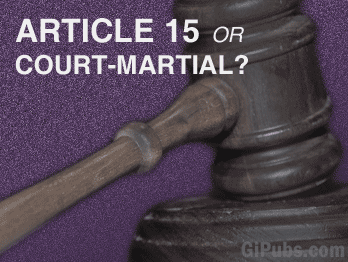What happens after the decision has been made to pursue Article 15 action? The following general advice is written primarily for Soldiers facing Article 15 punishment and leaders who have subordinates undergoing an Article 15. The focus is on Soldiers, but the same principles apply to Sailors, Marines, Airmen, and Coast Guardsmen.
Soldier Decisions

Soldiers must decide if they will accept Article 15 proceedings or elect for court-martial
Soldiers may accept or not accept Article 15 as a way to dispose of misconduct charges (assuming they are not embarked in a vessel). If the Soldier accepts Article 15, that is not by itself ‘pleading guilty.’ There is still the choice to plead guilty or not guilty.
If the Soldier pleads not guilty then she can present evidence and witnesses on her behalf. Unlike the other Services, the Army commander ultimately must find ‘guilt’ beyond reasonable doubt. Whether the commander finds the Soldier guilty or she pleads guilty, the commander then imposes a punishment she deems appropriate considering the circumstances of the misconduct, the Soldier’s attitude, and the quality of service.
Appeal of the punishment action
Once a Soldier has been found guilty, there are ways the decision can be modified or reversed. An appeal of Article 15 punishment alleges the imposition of punishment was unjust and/or too severe.
If the Soldier plead not guilty: The Soldier’s appeal can challenge both the justness of punishment and the severity of the punishment. Punishment can be considered “unjust” if there was not sufficient evidence of guilt and/or there was a significant failure to follow the correct procedures.
If the Soldier plead guilty: The Soldier is limited to appealing the punishment itself.
What if the Soldier gets in trouble again?
If a Soldier faces punishment under Article 15, a number of things can happen if they do not correct their substandard behavior. They can get another Article 15. They could be referred to court-martial. If the Soldier is sent to court-martial, the conduct underlying the first Article 15 can be charged. That is not double jeopardy.
Article 15(f), UCMJ, states:
“The imposition and enforcement of disciplinary punishment under this article for any act or omission is not a bar to trial by court-martial for a serious crime or offense growing out of the same act or omission, and not properly punishable under this article; but the fact that a disciplinary punishment has been enforced may be shown by the accuse upon trial, and when so shown shall be considered in determining the measure of punishment to be adjudged in the event of a finding of guilty.”
Keep in mind the case of United States v. Pierce, 27 M.J. 367 (C.M.A. 1989) which states that the Soldier must be credited with any punishment already served at the first Article 15.
The Soldier could also be administratively discharged with or without a new Article 15 punishment.













